Geography of Greece

Main Idea: Greece is mountainous and its city-states were isolated. The Greeks used the sea for travel and trade.
Greece is:
in southern Europe on the Mediterannean Sea
made up of 1,400 islands
surrounded by three seas--the Aegean, the Ionian, and the Mediterannean
mountainous
only 20% arable (land that can be used for farming)
has few natural resources. Main ones are grain, grapes and olives.
so mountainous that Greeks use the sea for travel and trade rather than land routes
has so few resources that the Greeks colonized other places for resources and additional land
has a very nice climate. Mediterannean Climate--warm, dry summers (not too hot), and cool, rainy winters (not too cold). An example of such a climate in the USA is California.
has a climate that encouraged those who lived in it to spend lots of time outside and together, either meeting at the marketplace or other venues. The Greeks became very social people.

Maps to Use on the Map Assignment
Wednesday, September 10
Minoans, Dorians and Mycenaeans
Main Idea: The Minoans culture, on Crete, influenced Greek culture. It was highly developed and disappeared suddenly.
Minoans:
Crete--island where Minoans lived. Biggest city was Knossos
Knossos--Minoan capital
Labyrinth--palace at Knossos, basis for legends about King Minos, the Minotaur, and Theseus
Contributions of the Minoans--art, architecture, religion, love of beauty, love of learning, iron
Linear A--writing system of the Minoans. Not decoded
Minoan Civilization ends==why? Tsunami/earthquake? Defeat by another culture?
Very advanced--large buildings, art, indoor plumbing, flush toilets

Myceneans, Dorians and the Dark Ages
Main Idea: The Myceneans built a powerful military kingdom on mainland Greece and defeated Troy to control trade. They then fell to the Dorians, and a Dark Age of no learning followed, during which Greek stories were kept alive by bards who told history as epics.
Myceneans--warlike conquerers who built large empire between 2000 and 1200 BC
Troy--a major trading city on Asia Minor (now Turkey) that the Myceneans fought in the Trojan War
Trojan War--The Myceneans vs. the Trojans, over control of trade
Dorians--took over Greece from the Myceneans. They had no learning, and for 400 years, there was a Dark Age in Greece.
Dark Ages--the period from 1200 BC to 800 BC when the Dorians ruled and learning stopped
Bard--a wandering story-teller who kept history alive during the Dark Ages. Passed down Mycenaean stories, turning them into myths, legends, and epics.
Timeline-- Minoans Myceneans Dorians
3000-1400 BC 1600-1200 BC 1200-800 BC
We learned the story of the wooden horse used to trick the Trojans into opening their gate.
Greek Legends and Myths
Thursday 9/10/15
Main Idea; Greek Bards traveled to spread the myths and legends of Greek heroes and the Olympians. The most famous epics, the Iliad and the Odyssey, were written by a blind poet named Homer around 750 B.C.
Bard - professional (traded for goods, places to sleep, food) traveling storytellers who shared oral histories (history shared through word of mouth) of Greece.
Myth - a story with a "kick" that explains why things are the way they are (why does the sun rise?) or give a lesson (if you're good, good things happen)
arete - a greek concept of the heroic ideal of excellence. Being the best you can be in your life, the sports you play, and the wars you fight. Greek version of enlightenment.
Homer - a blind poet who wrote the greatest pieces of Western Civilization, the Iliad and the Odyssey. We don't actually know if Homer was one person or several because all the information about him comes from hundreds of years after he was born.
Odyssey- a long, difficult journey with a hero who faces lots of tough challenges
Olympians- the gods and goddesses, such as Zeus and Aphrodite, that lived on Mount Olympus and watch over or interfered with the lives of the Greeks.
mortal - someone who will live their life and eventually die
immortal- someone who lives forever and doesn't die or is extremely hard to kill
Mount Olympus- a real mountain in Greece said to be the home of the Gods where they lived and watched over the Greeks
We watched these two movies:
Crete--island where Minoans lived. Biggest city was Knossos
Knossos--Minoan capital
Labyrinth--palace at Knossos, basis for legends about King Minos, the Minotaur, and Theseus
Contributions of the Minoans--art, architecture, religion, love of beauty, love of learning, iron
Linear A--writing system of the Minoans. Not decoded
Minoan Civilization ends==why? Tsunami/earthquake? Defeat by another culture?
Very advanced--large buildings, art, indoor plumbing, flush toilets

Myceneans, Dorians and the Dark Ages
Main Idea: The Myceneans built a powerful military kingdom on mainland Greece and defeated Troy to control trade. They then fell to the Dorians, and a Dark Age of no learning followed, during which Greek stories were kept alive by bards who told history as epics.
Myceneans--warlike conquerers who built large empire between 2000 and 1200 BC
Troy--a major trading city on Asia Minor (now Turkey) that the Myceneans fought in the Trojan War
Trojan War--The Myceneans vs. the Trojans, over control of trade
Dorians--took over Greece from the Myceneans. They had no learning, and for 400 years, there was a Dark Age in Greece.
Dark Ages--the period from 1200 BC to 800 BC when the Dorians ruled and learning stopped
Bard--a wandering story-teller who kept history alive during the Dark Ages. Passed down Mycenaean stories, turning them into myths, legends, and epics.
Timeline-- Minoans Myceneans Dorians
3000-1400 BC 1600-1200 BC 1200-800 BC
We learned the story of the wooden horse used to trick the Trojans into opening their gate.
Greek Legends and Myths
Thursday 9/10/15
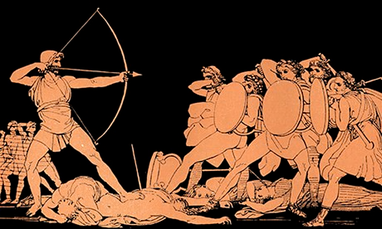 |
| Odysseus killing the sleazy suitors. |
Main Idea; Greek Bards traveled to spread the myths and legends of Greek heroes and the Olympians. The most famous epics, the Iliad and the Odyssey, were written by a blind poet named Homer around 750 B.C.
Bard - professional (traded for goods, places to sleep, food) traveling storytellers who shared oral histories (history shared through word of mouth) of Greece.
Myth - a story with a "kick" that explains why things are the way they are (why does the sun rise?) or give a lesson (if you're good, good things happen)
arete - a greek concept of the heroic ideal of excellence. Being the best you can be in your life, the sports you play, and the wars you fight. Greek version of enlightenment.
Homer - a blind poet who wrote the greatest pieces of Western Civilization, the Iliad and the Odyssey. We don't actually know if Homer was one person or several because all the information about him comes from hundreds of years after he was born.
Odyssey- a long, difficult journey with a hero who faces lots of tough challenges
Olympians- the gods and goddesses, such as Zeus and Aphrodite, that lived on Mount Olympus and watch over or interfered with the lives of the Greeks.
mortal - someone who will live their life and eventually die
immortal- someone who lives forever and doesn't die or is extremely hard to kill
Mount Olympus- a real mountain in Greece said to be the home of the Gods where they lived and watched over the Greeks
 |
| The Gods and Goddesses of Olympus in Hercules movie. |
A 4 minute version of the Odyssey: https://www.youtube.com/watch?v=EQofMaq2i_Y
A crash course in the Olympians: https://www.youtube.com/watch?v=eJCm8W5RZes
For more info on Greek Mythology watch this Documentary: https://www.youtube.com/watch?v=-MSEsh6jgHE
We had a research project assignment, Due Monday. Click this link for a copy to print or edit and type to turn in.
https://drive.google.com/a/isu.edu/file/d/0Bw1_Q53cQoRTVFg2aEQwQ2dZM1lpYzRsS3JvYlY0emFkTjYw/view?usp=sharing
Friday, September 11
Remembering 9/11 Assignment/Group Work


We had a research project assignment, Due Monday. Click this link for a copy to print or edit and type to turn in.
https://drive.google.com/a/isu.edu/file/d/0Bw1_Q53cQoRTVFg2aEQwQ2dZM1lpYzRsS3JvYlY0emFkTjYw/view?usp=sharing
Friday, September 11
Remembering 9/11 Assignment/Group Work
9/11 Lesson Morris 2015 Name:
Using the text, read the section assigned to you and then present it to the class. As each class presents, take notes below on the information about 9/11.
Group Two: The Attack on America (US 2-US-4)
1. Reporter’s Notes. USA Today reporter Kevin McCoy interviewed survivors. Give two quotes from survivors.
2. The ash from the collapsed buildings was ___ inches deep on Lower Broadway.
3. Why did the 9/11 terrorists target the Trade Centers and the Pentagon?
4. On the morning of 9/11, ____ commercial airliners were hijacked by ____ terrorists. The first plane hit the ___ tower of the World Trade Center, and _____ minutes later, the second plane hit the other tower. Less than an hour later, a third plane hit the ________________ in ___________________. Passengers in the fourth plane heard of the attack by cell phone. What did they do?__________________________________________________________
5. The fire and explosions caused ____ buildings to collapse or partially collapse. _____________ people died, including _______ police and _____________ firefighters.
6. How many survivors were pulled from the collapsed towers? _____
7. What were the airlines involved in the hijackings? ___________________ Where did each flight begin? ___________________ (Use map top of page)
Group Two: Rescue Efforts and the Search for Terrorists (US4-US5)
1. Though few survivors were found, the rescuers spent weeks recovering bodies and cleaning up the debris. The Towers had __________ tons of steel, _____________ cubic yards of concrete, and ________ acres of glass, a total of ______________ of toxic debris.
2. Investigation determined that __________________ a millionaire from ________________ was behind the attacks. He was hiding in ___________________, given protection by radical Muslims called the _________________ who ran the country at the time.
3. USA Today Chart (top of page). How much debris was removed per day? ______ By how many trucks? Trucks take the debris to barges that carry _______ tons each trip. All the debris is then sifted at a landfill to search for body parts and clues.
Group Three: Hunting the Terrorists (US6-US-9) ****
1. Since 1960 there have been ________ terrorist attacks around the world.
2. On the map, pick two places where there has been a major attack, then give its date and describe it.
3. Using the chart on US8, which continent has had the most terrorist casualties since 1995? _____________ Which has had the least? __________________
Group Four: Finding those responsible, Effect on American Life (US9-US11) (US13-US-15)
1. Who was President at the time of the 9/11 attacks? ________
2. The terrorist network linked to 9/11 was called ________________.
3. The US attacked the nation of _______________________ in the month of _____, and the year _____________ because ________________________.
4. In December, __________________, the Taliban was driven out of power.
5. The US also invaded the nation on Iraq, though the book does not mention this.
6. How did airports tighten security after 9/11?
7. The number of passengers dropped ___%, ______________ airline jobs were lost, and ____________ million dollars were lost by airlines after 9/11.
8. The stock market dropped _____ when it reopened after the attacks.
9. In October, 2001 President Bush signed an anti-terrorism law (US15). Give three things it allowed the government to do.
Group Five and Six: Newspapers
Read a 9/11 newspaper and analyze each section. How is the 9/11 attack covered? How did it affect the world of entertainment, sports, business, and life in general? Share your findings.
Group 7: Interview someone who witnessed 9/11 who is in this room. Find out:
1. How old were they?
2. Where were they when they found out?
3. What did they do/think?
4. How did it change their life?
Monday, September 13
Finish 9/11 work and present/turn in 9/11 papers
Begin Evolution of Government Types in Ancient Greece
A simplified reading is found on this link
Types of Greek Government
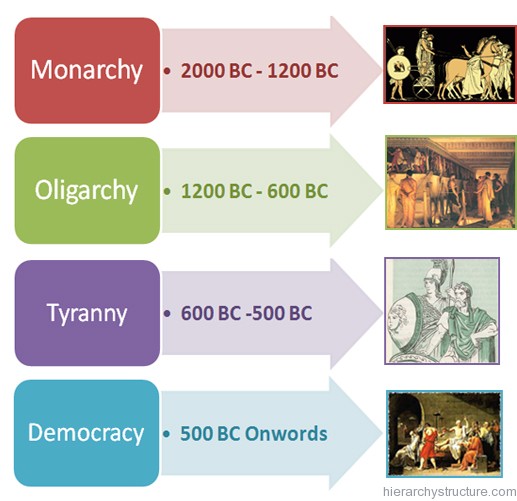 Main Idea: Governments are like living organisms. They evolve over time from monarchy to oligarchy to tyranny to democracy.
Main Idea: Governments are like living organisms. They evolve over time from monarchy to oligarchy to tyranny to democracy.
City-State--A city and all the land it controls. Because of the mountains, Greek city-states developed differently.
Monarchy--rule by a king or queen.
Oligarchy--rule by a small group of persons, usually wealthy landowners or merchants
Tryanny--rule by one person who uses the people to seize power
Tyrant-- a person who has no right to rule but seizes power with the help of the army/people
Democracy--rule by the people
Direct Democracy--everyone votes on every issue
Indirect Democracy--people vote for others to represent and vote for them.
Class Video: Watch Parts 1-4
September 15th: Greek CultureMonday, September 13
Finish 9/11 work and present/turn in 9/11 papers
Begin Evolution of Government Types in Ancient Greece
A simplified reading is found on this link
Types of Greek Government
Graphic Organizer with Cartoons:
 |
| I drew this on the board Monday, but it has to come down Tuesday. Ignore Osama and Taliban on the bottom. :) |

City-State--A city and all the land it controls. Because of the mountains, Greek city-states developed differently.
Monarchy--rule by a king or queen.
Oligarchy--rule by a small group of persons, usually wealthy landowners or merchants
Tryanny--rule by one person who uses the people to seize power
Tyrant-- a person who has no right to rule but seizes power with the help of the army/people
Democracy--rule by the people
Direct Democracy--everyone votes on every issue
Indirect Democracy--people vote for others to represent and vote for them.
Class Video: Watch Parts 1-4
Extension Activity (20 points)
Re-design our political system so that it better represents the needs and views of the American people. You must use at least TWO credible sources with data to back up your answers. Must be in ink and double-spaced, with a title, and must be five paragraphs.- How would you change laws about elections?
- Would you keep or abolish the electoral college? Why?
- Would you limit how long politicians could serve? Why?
- Would you change voting requirements, such as making people take a test to prove they understand the issues? Why or why not?
- Would you limit how people contribute money to candidates? Why or why not?
- Would you change the law so that a president or other politician could be voted out of office early? Why or why not?

Greek city-states developed very differently from each other because of their isolation from each other due to mountainous terrain and seas. Each was like an independent country with its own government, money, army and culture.
- City-State: a city and all the land it controls. Also known as a Polis (the Greek word for city)
- Acropolis: a cliff area or high place used as a fortress and also for temples The most famous acropolis is the one in Athens.
- Agora: a marketplace thad had all the public buildings such as markets, gymnasiums, temples, theaters and the place where Greeks would go to meet and visit each other as well as shop.
- Arete: the Greek concept of a Heroic Ideal, meaning excellence in Life, Sports, and War. The Greeks believed that a person must excel at all things of the mind, body and spirit.
- Women in Greece: in charge of keeping the home and raising children, and not a lot of rights or education, except in Sparta
- Greek art: naturalist sculpture, pottery, and frescoes (murals) that often depicted stories of the gods that would influence art in the Renaissance
- Theater: plays and festivals often dedicated to Dionysus that were hugely popular. Plays were 3 different types: comedy, tragedy, and satire. We still have many Greek plays, although most have been lost.

Some videos to watch:
Ancient Greek Theater: https://www.youtube.com/watch?v=aSRLK7SogvE
The Olympics: https://www.youtube.com/watch?v=K8ztMlmavBw

Thursday: Sept 17th Evolution of Government
See notes for Monday, September 13th. We reviewed these notes and discussed examples of each type of government.
Monarchy: Corinth
Oligarchy: Sparta
Tyranny: Pheidon in Argos (and Napoleon BONAPARTE, not DYNAMITE!)
Democracy: Athens
Reviewed Word Wall
Handed back maps and FB pages, checked grades.
Friday, September 18 and Monday September 21
Skeleton Notes: Comparing Athens and Sparta
The following is a T-chart. Draw it and fill it in in your composition book using the hyperlinked MME.

ResearchProposition: Athens has a superior system to Sparta for a majority of its citizens in the areas of EDUCATION, ROLE OF WOMEN AND CHILDREN, MILITARY STRENGTH, and CULTURAL ACHIEVEMENTS AND LEGACY. Here is a good debate. This is not the exact format we are using, but it gives you some ideas about what works/what doesn't. Here are some good sites for research. If you use them, make sure you cite them. Athens and Sparta Lesson PBS Athens vs Sparta Comparisons Student Notebook Grading Rubric To be filled in by the student on Tuesday, and then placed in flap. Worth ten points. I. Journal · I have a minimum of 12 entries. (Yes/No) · Each has a capital at the beginning of the sentence, end punctuation, and is a complete sentence. (Yes/No) · What am I missing?________________________________________ II. Notes · Table of Contents Page with lessons and page numbers · Notes o What is o History? (Yes/No) o Geography of Greece? (Yes/No) o Minoans, Dorians, and Mycenaeans (yes/No) o Greek Legends and Myths (Yes/No) o Types of Greek Government (Yes/No) o Greek Culture (Yes/No) o T-Notes comparing Athens and Sparta (finished by watching MME on website (Yes/No) o The Greek Army (Yes/No) · What am I missing? ___________________________________________________________________ III. Flap · Course Description (Yes/No) · Greece Map (Yes/No) · 9/11 Skeleton Notes (Yes/No) · Life Sketch (Yes/No) · Facebook God/Goddess Project (Yes/No) Mrs. Donnelly will hand back her graded papers today. She has many of these. · What am I missing? _____________________________________________ Mr. Morris has a few things to give back Wednesday. If it is missing and I have it, you’ll get it back Wednesday. Also, you can check Powerschool as all Mr. Morris’s grades are entered. Study Guide Quiz One: Greece-100 Points Morris-2015 On Thursday, we will have a quiz on vocabulary and key concepts from our lessons on the meaning of history and on Ancient Greece. This is the only time this year when there will be a study guide on a quiz. The reason for this is so you can see exactly what my expectations are on a quiz and can do well on it. From now on, quizzes can come at any time, on any day, and with no review other than that done in class and using your notes. The quiz will consist of an easy map, matching sections, some fill in the blanks, and some short answer/essay. There will be an amended version. Re-takes will be allowed and the scores averaged. Vocab quizzes are easy to study for. Make flash cards and use them. Also on Thursday, there will be a notebook check. It will be worth 60 points. On Tuesday, Mrs. Donnelly will go through a mock notebook check where you will grade your own notebook and journal using the rubric given out today. You will put that in your flap. All items will be returned to you no later than Wednesday. You may be missing a few recent assignments until then. Know the following: A. Big Idea Questions 1. How did the geography of Greece effect how it developed as a culture? 2. How is each individual important in history, yourself included? 3. Why is it important to carefully find out if what we read, see, or hear is true? 4. How does a person tell truth from falsehood (including different types of propaganda? 5. How did 9/11 change the world? How did the geography of Greece effect how it developed as a culture? 6. How is each individual important in history, yourself included? 7. Why is it important to carefully find out if what we read, see, or hear is true? 8. How does a person tell truth from falsehood (including different types of propaganda? 9. How did 9/11 change the world? 10. How do governments change over time? 11. Why did city-states such as Athens and Sparta develop so differently? Compare/Contrast. B. Vocabulary 1. History 2. Bias 3. Fact 4. Opinion 5. Source 6. Propaganda 7. Arable 8. Climate of Greece 9. Resources of Greece 10. Map: know Greece, Peloponnesus, Ionian Sea, Aegean Sea, Mediterranean Sea, Crete, Troy. 11. Minoans 12. Mycenaeans 13. Dorians 14. Dark Ages 15. Real Cause of Trojan War 16. Bard 17. Myth 18. Arete 19. Homer 20. Iliad and Odyssey 21. Olympians 22. Mortal vs. Immortal 23. City-state 24. Acropolis 25. Agora 26. Monarchy 27. Oligarchy 28. Tyranny 29. Democracy 30. City-state 31. Role of women in Athens and Sparta 32. 9/11, Casualties, Reason, Attacker, Targets 33. Hoplite 34. Phalanx 35. Importance of iron, citizen-soldiers Monday, October 5 The Rise of Democratic Athens Cleisthenes: The Father of Democracy Main Idea: Athens had many different types of government before becoming a democracy. Athens is knows as the world's first great democracy and served as a model for all other western democracies, including ours in the United States. Timeline towards Democracy Age of Kings--before 800 BC Age of Oligarchy (800-650 BC) Athens governed by rich landowning citizens Oligarchs used power to enrich themselves Did not help middle or lower classes As trade increased, workers wanted more say Age of Tyrants-- (650-500 BC) 621 Draco--strict tyrant, harsh rules, hated by middle class 594 Solon--improved lives of middle class. Gave middle class some power by creating the Assembly. 564 Peisistratus--seized power, popular with middle class, but his son Hippias was bad and the people revolted, leading to CIVIL WAR. Age of Democracy (508 BC) Cleisthenese gave all male citizens the right to vote in the Assembly. Broke up the power of rich landowners Council of 500--- chosen by lot from all Athenian male citizens to propose laws to the Assembly. Ostracism--once a year, citizens could vote to force someone they thought was too powerful to leave Athens. (Just a fancy word for kicking somebody out of town)  These small clay pots, called ostraca, were used to vote out tyrants by Athenian citizens MME: You can watch it HERE. :) If you are absent watch the following: The Dawn of Democracy Also recommended to watch if this interests you ( especially segments one and four): Greece: Crucible of Civilization Tuesday, October 6th: Persian Wars Begin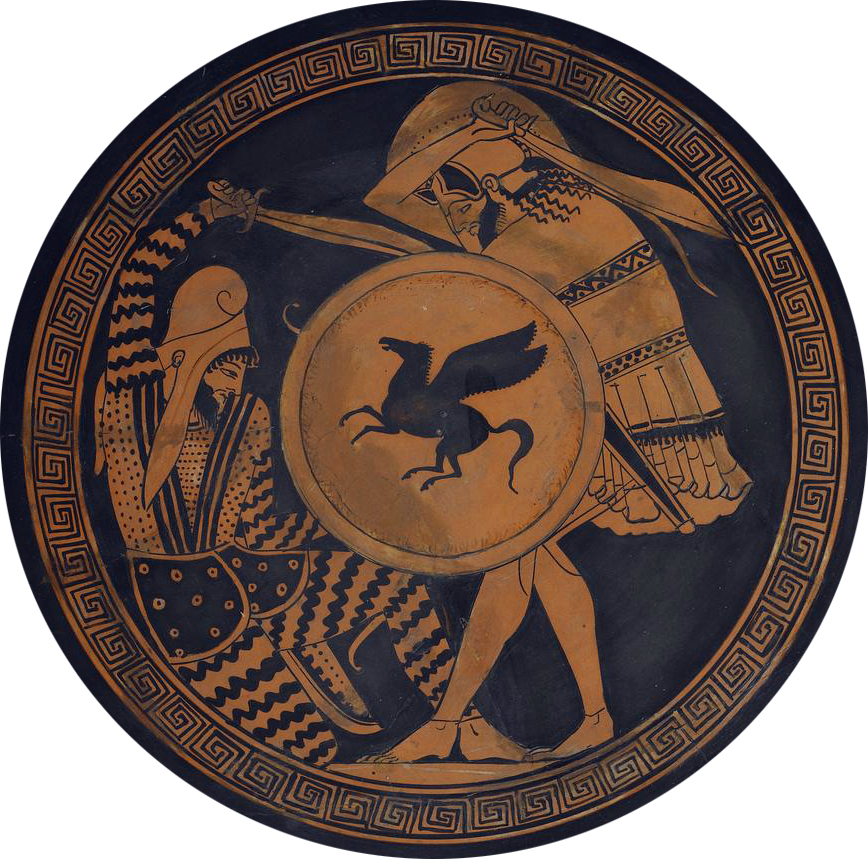 Main Idea: Tiny Greece defeated the giant and mighty Persian Empire and in doing so saved Western Civilization. These wars started because Persia was mad at Athens for helping Ionians. Vocabulary Persia--huge empire that controlled much of the Middle East, now Iran Darius I--Persian king and general. Led Persia in the First Persian War. Ioninan Revolt – Greeks living under Persian rule who rebelled with the support of Athens (and lost), made Persia mad revolted against being under the rule of an emporer Battle of Marathon (490 BC) - Led by Darius I, against Athens. Athens wins, losing only 200 while the Persians lose over 6000. Pheidippides – Greek ran 26 miles to tell Athens of victory and died. People run marathons even today, a 26 mile race. A marathon is the only Olympic sport to be named after a battle. Persian army: archers, light infantry, heavy infantry (Immortals) who were legendary fighters, feared for their veils and silent fighting Greek army: hoplites in phalanx formations, iron and bronze spears/armor/weapons Xerxes--Son of Darius I. Persian king and general. Led Persia in the Second Persian War to burn Athens to the ground as revenge for the battle of Marathon Greek league -- an alliance of Athens, Sparta, and 31 other Greek city states in the war against Persia ----FIRST TIME people consider themselves "Greek" Watch THIS video: Battle of Marathon (this is part 3) If you are intereseted, the whole documentary is also available on Youtube. Part 1 Part 2 Part 4  Wednesday, October 7Persian War: Part Two: Go Big or Go Home!!Main Idea: Ten years after Darius lost the Battle of Marathon, his son Xerxes attacked Greece again, and Greece defeated the Persians after battles at Thermopylae, Salamis, and Plataea. Xerxes-- army of between 250,000 and 1 million men, some by land and some by ship. Hellespont-- narrow waterway above the Aegean Sea. “Bridge of Ships”. · Thermopylae-- narrow valley surrounded by steep mountains made “last stand”. If Persians break through, they could take Athens and then all of Greece. (you are getting close. Next clue: "The 300 hold the line") · Battle of Thermopylae--7,000 Greeks, including 300 Spartans, faced 100,000 Persians. Greeks led by Spartan King Leonidas.  · The Spartans held the pass while the rest of the Greek army evacuated Athens and moved the city and army to Salamis to fight another day.
· All but one Spartan died. · Video Links: The Battle of Thermopylae: History Channel We will Blot out the Sun: Clip from the movie '300' · Trireme--a triple decker warship that was rowed by oarsmen and had a battering ram on the front. · Battle of Salamis--Persian fleet tricked into entering a narrow channel and then defeated by Greek triremes.  · Battle of Platea--the final battle of the Persian Wars. A Greek victory. Persia goes home after this battle. · Themistocles--great Athenian leader who won the Battle of Salamis. Video Links to Support this Lesson: The Battle of Salamis Thursday, October 8th 2015: Reasons for the Golden Age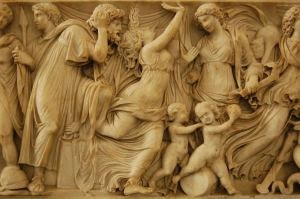 MAIN IDEA: After winning the Persian Wars, Athens became a super power and created much of the basis for Western Civilization. Golden Age: 480-430 BC. Time of learning and discovery in Athens Delian League: alliance that paid Athens and made Athens very rich. Between 150-200 city states. Originally formed as a protection against further Persian threat Since Athens was so rich there was extra money to spend on: Art: focused on the the "ideal form" of humanity - very perfectly balanced and proportioned --- no physical flaws, happy, relaxed faces. People were shown as they could be, not as they were. Imperfections were usually overlooked. Architecture Parthenon--the greatest building of Athens, temple to Athena Columns Doric - simple Ionic-scrolls Corinthian - ornate and flowery Frieze--a sculpture that extends out from a flat surface but which is not truly three-dimensional Drama--a story written to be acted on a stage. Greek drama was performed: 1. to entertain the audience 2. to teach moral lessons to the audience 3. to teach history to the audience 4. to entertain the gods and godesses Types of Drama1. Comedy--an amusing play with a happy ending. A. Slapstick Comedy--a comedy involving physical pain and crude humor (Dumb and Dumber, The Three Stooges) B. Satire---comedy that pokes fun at something or someone. (Saturday Night Live, Monty Python, Colbert Report)2. Tragedy--a play with a character who has a tragic flaw that brings that character and/or others to a sad end. Tragic Flaw---a character trait that becomes a character's downfall. (anger, jealousy, pride) Greek Chorus--people who stand behind the actor and narrate the action as needed.  Video Links:Clips from Oedipus Rex, showing the costuming, masks, chorus and speaking style.Examples of Slapstick-- Slapstick Symphony with The Three Stooges and Laurel and Hardy Lady having trouble para sailing. 1. Athens: The Delian League and The Golden Age 8 min2. The Golden Age: Start at 28:11 3. Building the Parthenon 5:00 Friday, October 9
Main Idea: Under the great Athenian leader Pericles, Athens had 30 years of brilliance in learning and art that changed Western Civilization forever.
II. Philosophers Search for Truth
Main Idea: Greek philosophers used reason to seek truth.
Monday, October 12 The Trial of Socrates We will discuss the charges, conduct the trial, and students will do a pre-trial survey as well as have homework on the following two questions:
Part Two: Short
Essay (Minimum of one paragraph,
with a thesis statement, at least two supporting details, and a
conclusion). You may use this or attach
another sheet. It may be typed or
hand-written. Due Wednesday.
I.
In your
opinion, is Socrates innocent or guilty of the charge of disrespecting the
gods? Give at least two reasons why you
find him innocent or guilty.
II.
In your
opinion, is Socrates innocent or guilty of the charge of corrupting the youth
of Athens (teaching them to do wrong)?
Give at least two reasons why you think so.
Students will use class discussion, the trial itself, and the following link to do this.
 Tuesday, October 13th Plato's Allegory of the Cave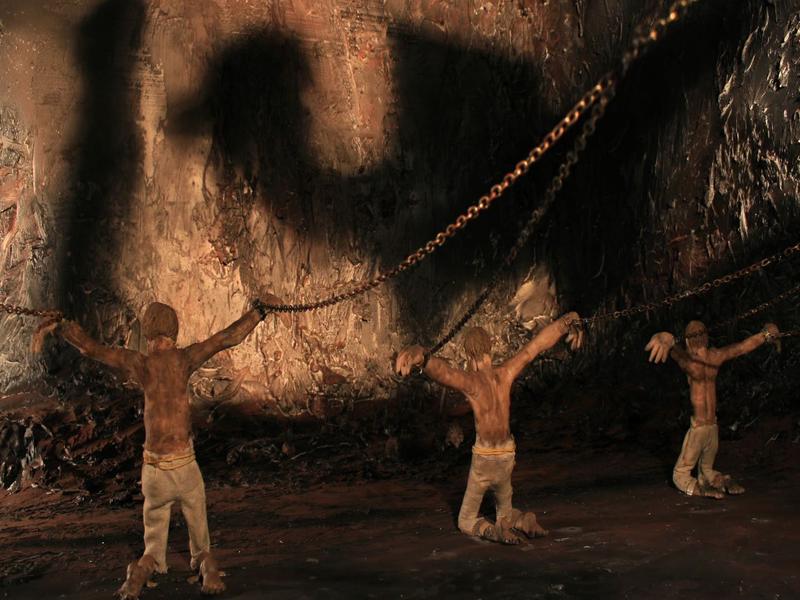
Plato: student of Socrates, wrote down teaching of Socrates. Wrote the Republic about an ideal society divided into three groups (workers, warriors, rulers) and how to define justice and how a man or a city state can be good.
Allegory: a story with a hidden meaning or message which is usually a life lesson
Allegory of the Cave: a discussion between Socrates and Plato's brother Glaucon about truth and education.
Read this and illustrate the Allegory (turned in as an assignment)
Watch these videos:
Claymation of Allegory of the Cave Red Pill or Blue Pill? From the Matrix Matrix and Allegory of the Cave Wednesday, October 14
The Peloponnesian War
Main Idea: The Peloponnesian War between Athens and Sparta doomed Greece.
Delian League--Athens and its Allies
Peloponnesian League--Sparta and its Allies
Causes---Athens builds wall, distrust between Athens and
Sparta, dissatisfaction of Athens' allies.
Peloponnesian War--27 years long. 431-404 BC.
Plague of Athens-430 BC, killed 1/3 of the population of
Athens, including Pericles
Finally, Sparta allies with Persia, builds a navy, and
defeats Athens, which surrenders in 404.
Greece is now so weak it will be taken over by
Macedonia. But Greek culture lives on!
If you are gone, watch this twelve-minute video on the Peloponnesian War Friday, October 16
Alexander the Great
Main Idea: Though a Macedonian, Alexander the Great
was a lover of everything Greek and spread Greek culture throughout the known
world.
Thursday, October 15th
WHITE PAPER REVIEW IN CLASS. Answer each one and turn in for FABULOUS extra credit!
Monday, October 19
Alexander the Great's Conquests
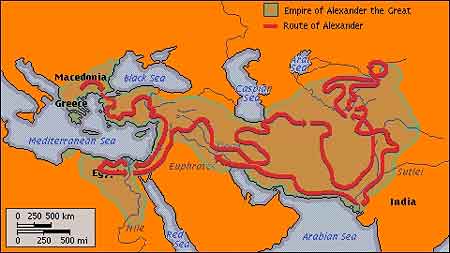
Main Idea: ATG conquered Egypt, Persia and parts of
India, spreading Greek culture and combining it with the others to form
Hellenistic culture.
334 BC--ATG defeats Persian King Darius II and Issus. Darius
offers ATG half his kingdom but A refuses.
332 BC--ATG marches into Egypt and is crowned Pharoah, a god
on earth. He also plans his great city of Alexandria, which becomes the
center of learning in the Hellenistic World.
He then conquers the rest of Persia and marches into India.
327 BC---invades India but army wants to go home. 7
years and 15,000 miles.
On the way home, in 323 BC, ATG dies of a fever.
Legacy--Hellenistic culture--spreading Greek culture to
every area he conquered.
Links: Bucephalus: The World's Greatest Horse Alexander the Great vs Persia: History Channel Alexander: A Full Documentary (over one hour) Tuesday, Oct. 20th: Hellenistic Culture.jpg)
Main Idea: Alexander
spread Greek culture throughout his empire.
He also combined the best features of Persian, Egyptian and Indian
cultures into it to create a new culture called HELLENISTIC culture.
Alexander set up governments wherever he went, rewarding
those who were loyal. He let conquered
peoples join his armies. He was ruthless
to those who resisted.
Alexander planned his greatest city, Alexandria, at the
mouth of the Nile River. This way it
could control all African trade.
The Lighthouse of Alexandria was the world's first
skyscraper, 400 feet tall, and could be seen for eighty miles by ships looking
for its harbor.
Alexandria had the world's first museum, so called because
it was dedicated to the Muses, the 9 goddesses of creativity.
Alexandria had the world's greatest LIBRARY, holding 1.5
million papyrus scrolls and most of the world's learning at that time. Sadly, the library burned down setting the
world back hundreds of years.
Some Accomplishments by Scholars in Alexandria:
Seven Wonders of the Ancient World: classical landmarks often attended by Hellenistic tourists that were eventually written down into "guidebooks" by Herodotus and Antipater of Solon.
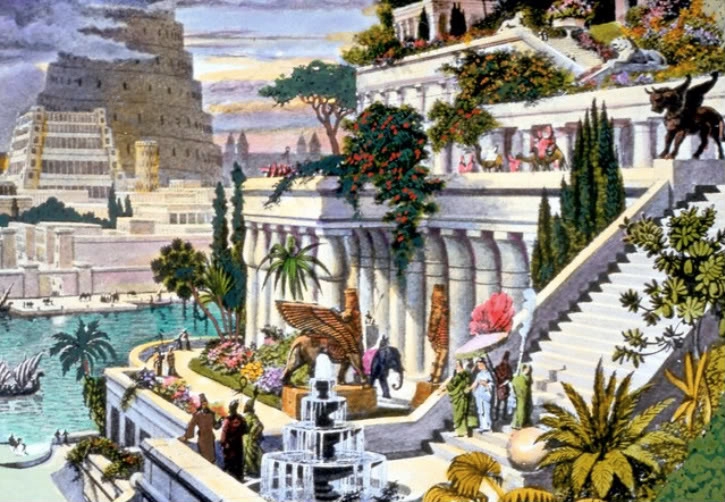
Watch this video: 7 Wonders of the Ancient World
Watch this video: Alexander and the Hellenistic Age
Bonus video: 7 Wonders, Minecraft Edition
BBC Documentary on the 7 wonders (Highly recommended!!!)
Study Guide for Test
Morris World History 2015

1.
Map: Know the following and be able to locate them
on a map: Peloponnesus, Macedonia,
Ionian Sea, Aegean Sea, Mediterranean Sea, Hellespont, Crete, Troy.
2.
How did Greece’s geography make it a great
trading nation?
3.
How did Greece’s geography affect the way
city-states developed?
4.
Why did Athens come into conflict with Persia?
5.
What was the result of the First Persian War
between Darius and Athens? What was the
war’s most famous battle? How did Athens
win?
6.
Who led Persia in the second Persian War?
7.
How many men did he bring? How did he get his infantry across the
Hellespont?
8.
Where did the Greeks make their defense, and
why?
9.
Was the Battle of Thermopylae a victory or
defeat for Greece? Explain your answer
10.
What general led the defense of Thermopylae and
how many men did he use? What was the
result?
11.
What happened at the Battle of Salamis that
allowed Greece to win? Give two reasons.
12.
What is the importance of a trireme? What is the importance of Themistocles?
13.
The final battle of the Persian Wars was fought
at ____________ and won by ____________.
14.
How did the Persian Wars make Athens wealthy and
strong?
15.
What is the Golden Age of Athens? Why is it called that? How long did it last?
16.
Who led Athens during its Golden Age and what
were his 3 goals for Athens?
17.
What was the importance of the Delian League in
funding the Golden Age?
18.
What is the Parthenon and why is it important?
19.
What is the Greek idea of THE IDEAL (Plato’s
Forms)? Why did this drive them to such
great advances in most fields?
20.
Identify a Doric, Ionic, and Corinthian column
on sight.
21.
What did the Greeks believe about their god and
goddesses?
22.
What are the two types of Greek drama?
23.
What are the two types of comedy and define
each.
24.
In a tragedy, the main character has a
_____________ that leads him/her to ruin.
25.
How were Greek plays different from modern
plays?
26.
What did Greek sculpture show? (Balance, proportion, and the ____)
27.
What is a 3-D sculpture that extends from a flat
background?
28.
What is a philosopher?
29.
How did Socrates teach? How did this get him in trouble? What crimes was he charged with?
30.
Who was Plato?
What was he speaking of in his Allegory of the Cave. Be able to draw a picture of this allegory.
31.
What did Socrates and Plato believe about
democracy and why?
32.
What kind of government does Plato suggest in
the Republic?
33.
What do you call a design made by using small
colored tiles or stones?
34.
What caused the Peloponnesian Wars?
35.
What did Athens build to protect itself? How did this backfire?
36.
What caused the Plague of Athens and how many
did it kill?
37.
Who won the Peloponnesian Wars? Support your answer.
38.
Who were the Macedonians? Where did they live in relation to
Greece? Did the Greeks consider them
Greek? Why or why not? Did the Macedonians consider themselves
Greek? Were they?
39.
Who built the great Macedonian Army and
conquered Greece?
40.
Who was his wife? Who was his son?
41.
Why did Alexander love learning and Greek
culture so much?
42.
Why was the incident with Bucephalus so
important to Philip?
43.
Who was Bucephalus? What was his fear?
44.
Why did Alexander have suspicions that he might
be a god?
45.
What happened to Philip and why?
46.
What two improvements did Philip make to his
armies?
47.
Who was Alexander’s hero? What was his favorite
book? How did it influence him?
48.
After Issis, what deal did Darius offer
ATG? What was ATG’s response? Why?
49.
How did ATG’s crowning as Pharaoh of Egypt add
to his belief that he might be divine (a god or demi-god)?
50.
How did ATG spread Greek culture?
51.
How did he treat the civilizations he conquered?
52.
What is the greatest city of learning in the
Hellenistic World?
53.
What four civilizations make up Hellenism?
54.
What famous building existed in Alexandria? What happened to it and how did that change
history?
55.
Name four of the seven wonders of the ancient
world.
56.
Name two or three advances/discoveries made by
Hellenistic thinkers and inventors.
57.
How many years did ATG spend conquering the
world? How many miles did his army
march?
58.
Why did ATG finally turn back and go home?
59.
Why did ATG die?
How old was he?
60.
What happened to ATG’s kingdom after his death?
Thursday, Oct 22. Continued Study Guide for Monday Test.
Due date for 7 wonders assignment extended to Friday. See Tuesday's notes.
Friday, Oct. 23 Jeopardy Review All Period Monday, Oct. 26 TEST ALL PERIOD Tuesday, Oct 27 1. Finish Page Two of Test (15 minutes) 2. Assignment: Due Wednesday: Prompt: Red Pill or Blue Pill. Tell me why in paragraph format. Red pill = you will wake up knowing the truth and reality even if it is terrible, blue pill = you remain ignorant but unknowing of the truth, good and bad. Compare your own life to that of a prisoner in Plato’s cave. What causes you to see a shadow of reality rather than reality itself? What could you do to break free? 3. Rubric for Notebook Check (Not Including New Notes and Journals for this week)
Notebook Grading Rubric for October 2015
I.
Notebook
a.
Rise of Democratic Athens
b.
Persian Wars Begin
c.
Persian Wars Part Two
d.
Reasons for the Golden Age
e.
Pericles and the Golden Age of Athens
f.
Plato’s Allegory of the Cave Vocab
g.
The Peloponnesian War
h.
Alexander the Great: Background
i.
Alexander the Great’s Conquests
j.
Hellenistic Culture
k.
Review Notes for Test # 1-60
L. Geography of Rome M. Latins, Etruscans and Greeks N. The Roman Repubic
II.
Flap
a.
Quiz One
b.
Allegory of Cave Handout
c.
Study Guide for Greece Final Test
III.
Journal
a.
Minimum of eleven entries
|






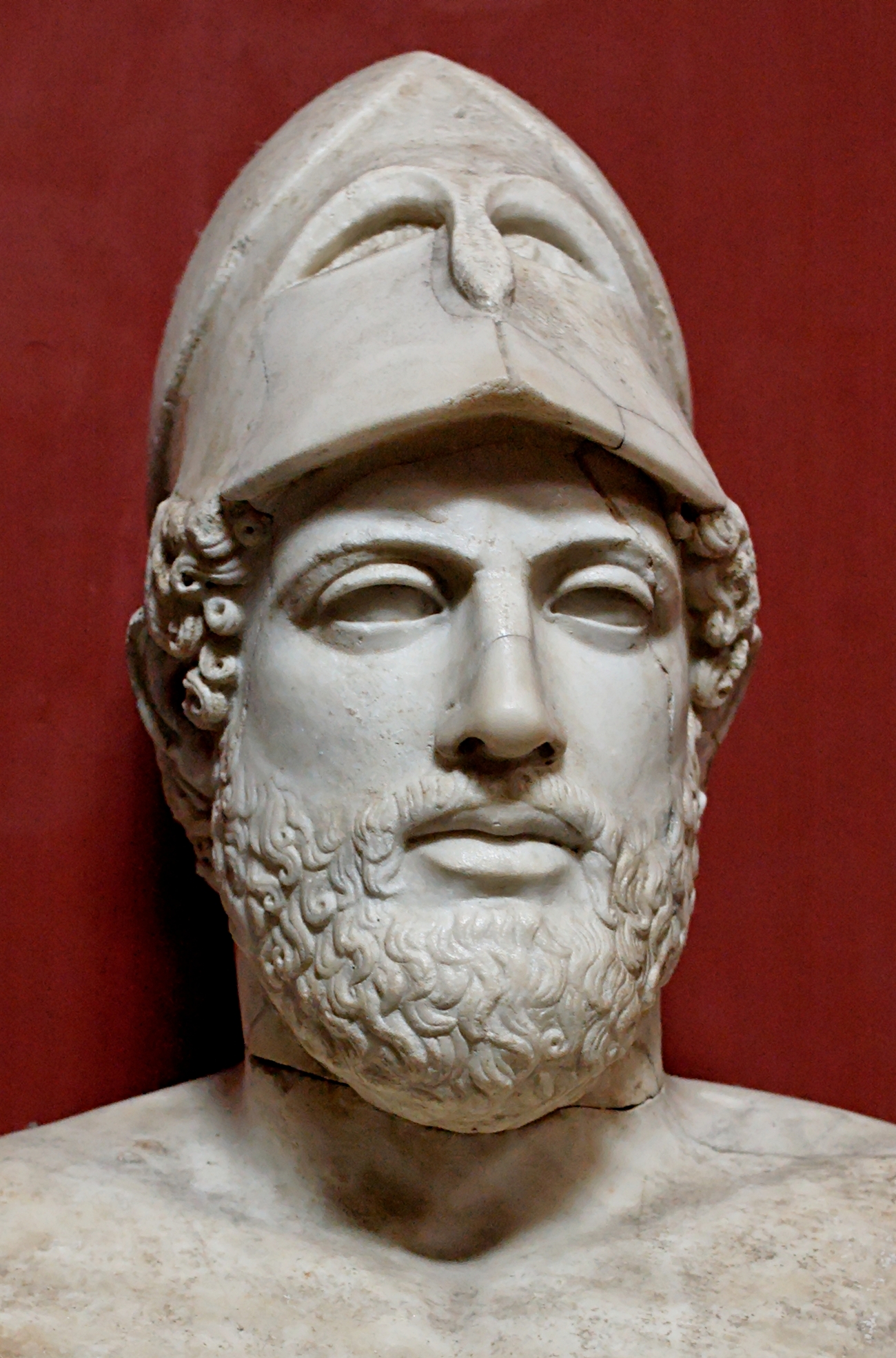

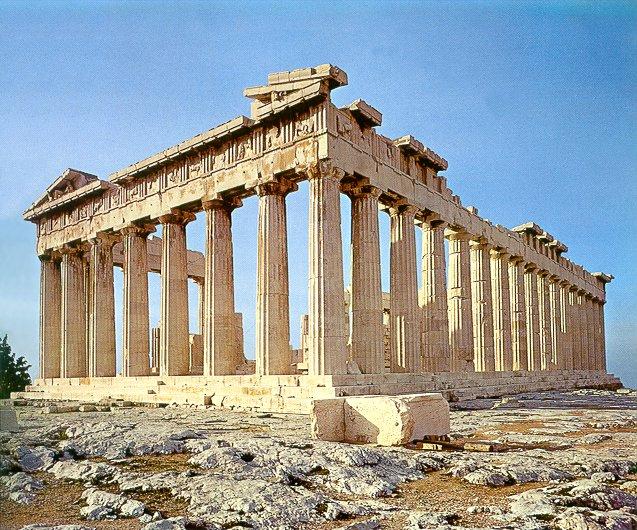






No comments:
Post a Comment